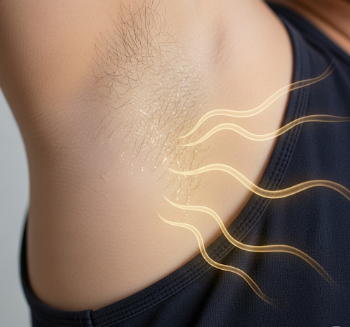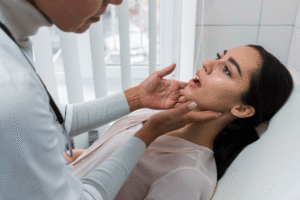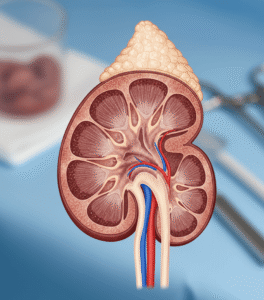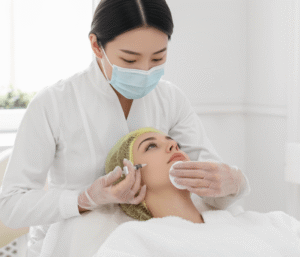Overview
Body odor (BO) refers to the unpleasant smell produced by the body, most commonly from sweat interacting with bacteria on the skin. While sweating is a natural process to regulate body temperature, the breakdown of sweat by bacteria can generate distinct, often strong odors. Body odor can vary depending on hygiene, diet, hormonal changes, and underlying medical conditions.
In South Korea, dermatology and wellness clinics provide comprehensive evaluation and treatments for body odor, ranging from lifestyle and hygiene guidance to advanced medical interventions for cases linked to medical conditions.
Key Facts
Highlights:
➡️ Body odor results from bacterial decomposition of sweat, particularly in the underarms, feet, and groin.
➡️ Diet, stress, and hormonal changes can influence the intensity and type of odor.
➡️ Medical conditions such as hyperhidrosis, diabetes, or metabolic disorders may contribute to abnormal body odor.
➡️ South Korea offers advanced dermatological care, hygiene solutions, and lifestyle counseling for managing body odor.
➡️ Regular hygiene and monitoring can prevent social and psychological distress caused by persistent odor.
What is Body Odor?
Body odor is the distinctive smell produced when sweat glands secrete fluids that bacteria break down on the skin surface.
Characteristics include:
- Strong or unpleasant odor in areas like underarms, feet, scalp, and groin
- Varies with activity, stress, diet, and hormonal changes
- May be temporary (sweat-induced) or persistent (medical condition-related)
- Often more noticeable during physical activity or in hot climates
- Can affect social interactions and psychological well-being
Although common, persistent or unusual body odor may indicate underlying health issues.
What Symptoms are Related to Body Odor?
Symptoms are usually related to sweating and bacterial activity, but may also reflect systemic issues:
- Noticeable odor in areas like underarms, feet, scalp, or groin
- Excessive sweating (hyperhidrosis) in some cases
- Skin irritation or redness from moisture accumulation
- Changes in odor characteristics (sweet, fruity, or ammonia-like) may indicate metabolic conditions
- Social anxiety or embarrassment related to persistent odor
Highlights:
➡️ Body odor is often strongest after exercise, stress, or hormonal changes.
➡️ Unusual smells may signal systemic or metabolic disorders.
What Causes / Possible Causes of Body Odor?
Highlights:
➡️ Apocrine Sweat Glands: Found in underarms and groin, these glands produce sweat rich in proteins that bacteria break down, creating odor.
➡️ Eccrine Sweat Glands: Though mostly water and salts, excess sweating can contribute to odor when mixed with bacteria.
➡️ Poor Hygiene: Infrequent washing or inadequate cleaning of sweat-prone areas.
➡️ Diet: Foods like garlic, onions, spicy foods, and certain spices can influence body odor.
➡️ Hormonal Changes: Puberty, menstruation, pregnancy, or menopause can increase sweat production and alter odor.
➡️ Medical Conditions:
- Hyperhidrosis: Excessive sweating leading to increased bacterial activity.
- Diabetes or ketoacidosis: Can cause sweet or fruity-smelling sweat.
- Trimethylaminuria (fish odor syndrome): Rare metabolic disorder causing strong odor.
- Liver or kidney disease: Can alter body odor characteristics.
➡️ Stress and Anxiety: Emotional sweating can intensify odor.
When Should I See My Doctor?
Highlights:
➡️ If body odor is sudden, severe, or unusual without clear hygiene or dietary causes.
➡️ If associated with other symptoms such as fatigue, weight loss, jaundice, or frequent urination.
➡️ Persistent odor despite proper hygiene and deodorant use may indicate a metabolic or endocrine disorder.
➡️ For children or teenagers with abnormal odor, early evaluation can detect treatable underlying causes.
➡️ Early consultation ensures appropriate management and prevents social or psychological complications.
Care and Treatment
Management focuses on hygiene, lifestyle modifications, and addressing underlying causes:
Highlights:
➡️ Regular Hygiene: Daily washing with antibacterial soap, proper drying, and clean clothing.
➡️ Deodorants and Antiperspirants: Reduce odor and sweating; antiperspirants block sweat glands temporarily.
➡️ Dietary Modifications: Limiting odor-causing foods like garlic, onions, and certain spices.
➡️ Medical Treatments:
- Prescription-strength antiperspirants for hyperhidrosis
- Oral medications (anticholinergics) for excessive sweating
- Treatment of underlying metabolic disorders or infections
➡️ Laser or Surgical Options: Botox injections or minimally invasive surgery for severe hyperhidrosis.
➡️ Lifestyle Adjustments: Wearing breathable fabrics, managing stress, and avoiding excessive heat.
➡️ Psychological Support: Counseling for anxiety or social embarrassment due to persistent odor.
Treatment Options in Korea
South Korea provides advanced dermatology and wellness care for body odor management:
Highlights:
➡️ Dermatology Clinics: Diagnosis of hyperhidrosis, bacterial infections, or skin-related causes.
➡️ Lifestyle and Nutrition Counseling: Guidance on diet and habits to reduce odor.
➡️ Advanced Treatments for Hyperhidrosis: Botox injections, microwave therapy, or surgical options.
➡️ Metabolic and Endocrine Evaluation: Testing for diabetes, liver, or kidney disorders.
➡️ Multidisciplinary Care: Dermatologists, nutritionists, and endocrinologists collaborate for optimal management.
➡️ Preventive Guidance: Education on hygiene, stress management, and clothing choices.
➡️ Medical Tourism Support: Structured evaluation, multilingual consultations, and follow-up care for international patients.












